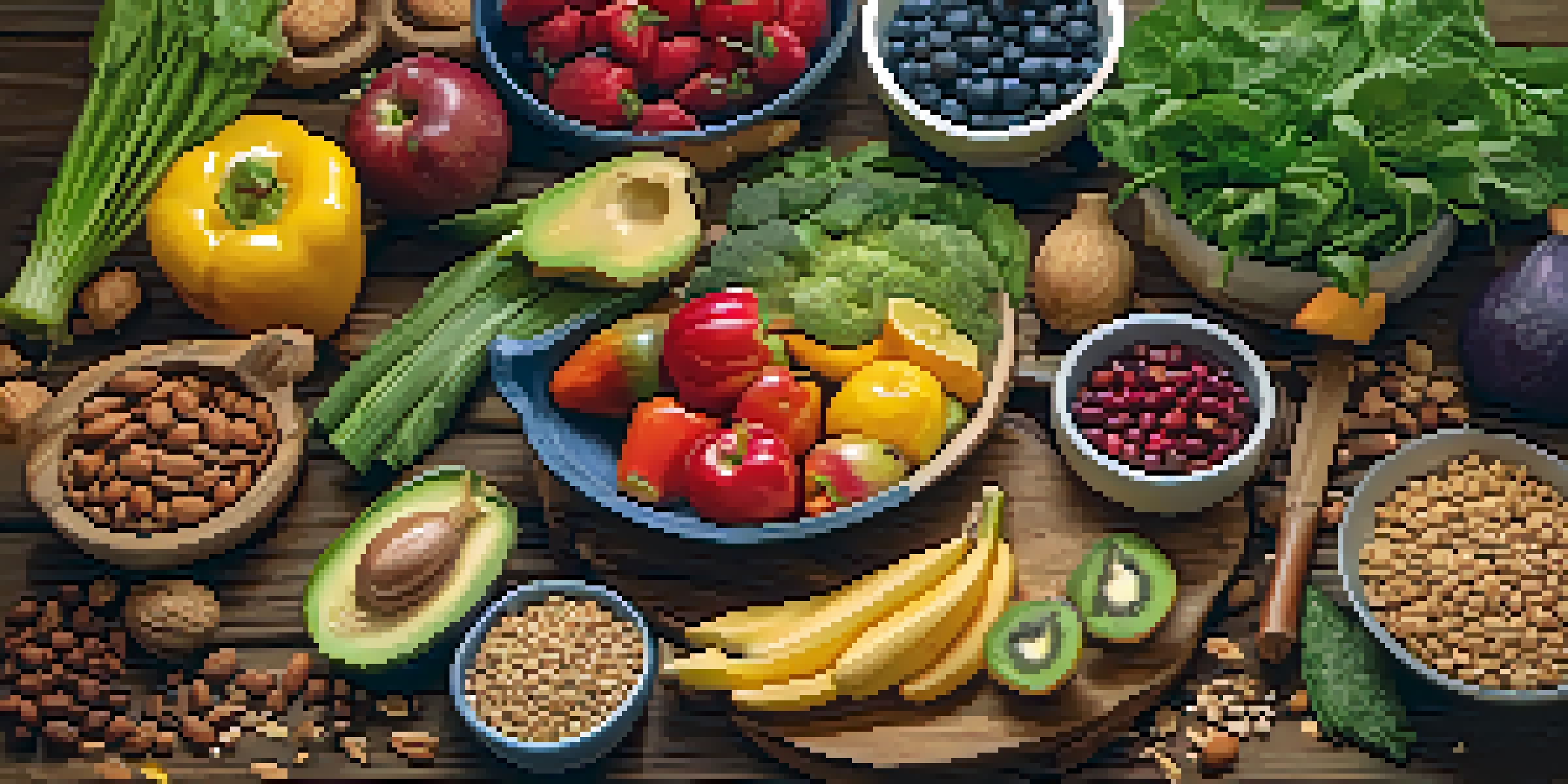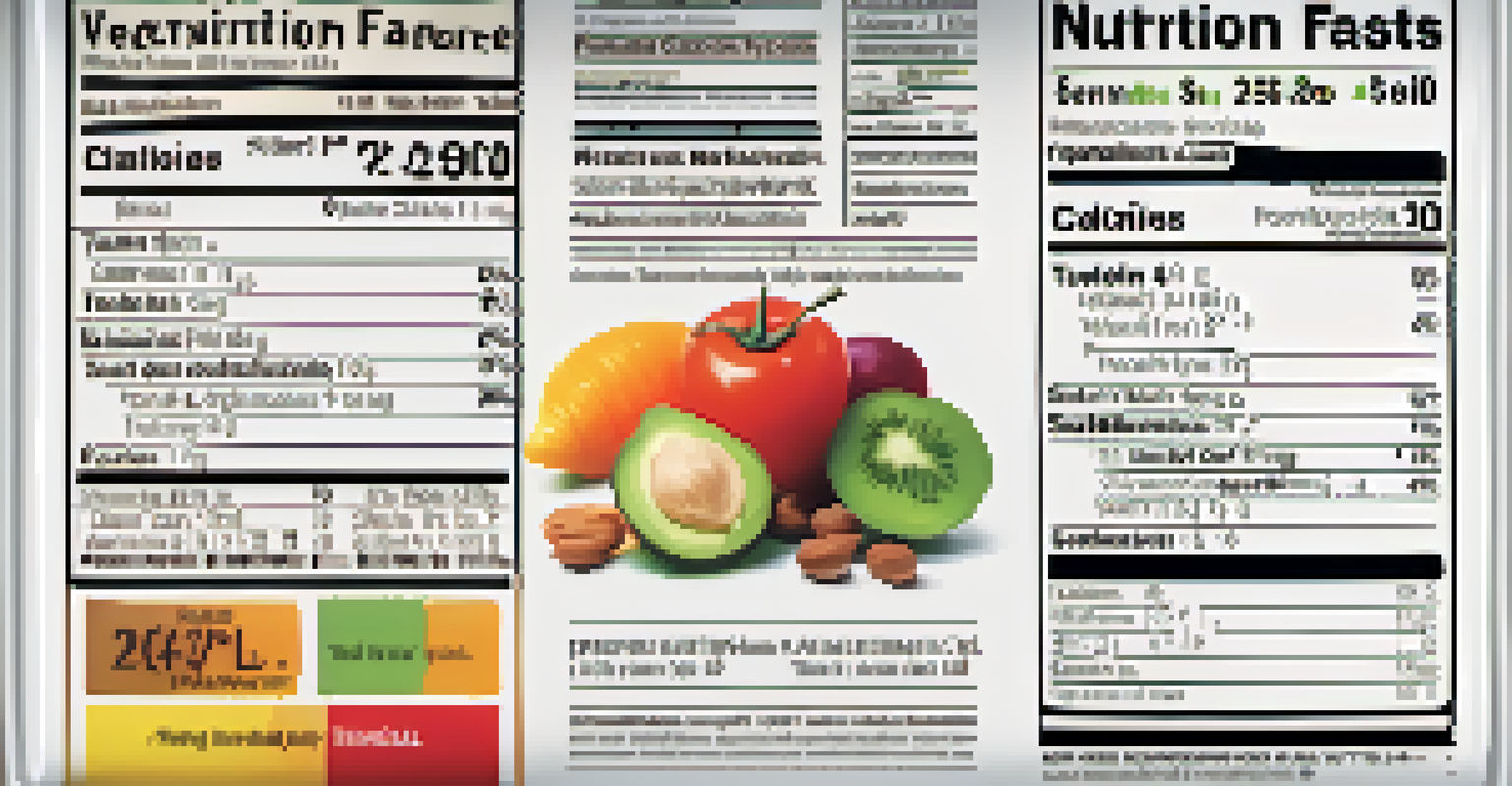All About Vegan Nutrition Labels: Ingredients and More

What Are Vegan Nutrition Labels and Why They Matter
Vegan nutrition labels are essential tools for anyone following a plant-based diet. They provide critical information about the ingredients and nutritional content of food products. By understanding these labels, you can make informed choices that align with your dietary preferences and ethical beliefs.
Let food be thy medicine and medicine be thy food.
Many people assume that all plant-based foods are inherently healthy, but that's not always the case. Some processed vegan products can be high in sugars, unhealthy fats, or additives. Therefore, reading the labels helps ensure that you're getting truly nutritious options that support your health goals.
Moreover, vegan nutrition labels can help avoid allergens and unwanted ingredients. For those with dietary restrictions, knowing what’s in your food is vital. This knowledge empowers you to choose products that not only meet your vegan standards but are also safe for your specific dietary needs.
Key Components of Vegan Nutrition Labels Explained
Most vegan nutrition labels will include key components such as serving size, calories, fats, carbohydrates, and protein. Understanding these components can help you gauge how a product fits into your daily dietary needs. For instance, if you're looking to increase your protein intake, checking the protein content is essential.

Additionally, labels often highlight vitamins and minerals, which are crucial for maintaining a balanced diet. Look for vegan foods fortified with nutrients like vitamin B12, iron, and calcium, as these can sometimes be lacking in plant-based diets. This information is particularly important for vegans to ensure they’re getting enough essential nutrients.
Importance of Reading Labels
Understanding vegan nutrition labels helps ensure you're making informed choices that align with your health goals and dietary preferences.
Don’t forget about the ingredient list, which is often found on the back of the packaging. This list details every component used in the product, and it's a great way to confirm that a product is genuinely vegan. If you come across terms like 'casein' or 'gelatin,' those are red flags as they indicate animal-derived ingredients.
Understanding Ingredients: Common Vegan Additives
While many ingredients are plant-based, some additives can be a bit misleading. For example, certain colorings and flavorings may be derived from animal sources, so it's crucial to familiarize yourself with these components. Ingredients like 'carmine,' which is made from cochineal insects, are not vegan-friendly despite being natural.
Eating plants is not only good for your health; it’s good for the planet.
On the flip side, there are numerous vegan-friendly additives that can enhance the nutritional profile of foods. Ingredients like nutritional yeast provide a cheesy flavor along with B vitamins, making them a popular choice among vegans. Knowing what's beneficial can help you select more nutritious options.
Moreover, some brands use innovative plant-based alternatives to replace animal products. For instance, aquafaba, the liquid from canned chickpeas, is often used as an egg substitute in vegan baking. Understanding these ingredients can open up a world of possibilities in your cooking and baking.
How to Spot Hidden Animal Products in Labels
Even with a product labeled as vegan, hidden animal-derived ingredients can sometimes slip through the cracks. Words like 'lactose,' 'whey,' or 'honey' are common culprits that can mislead unsuspecting consumers. That's why it's essential to scrutinize the ingredient list closely.
Additionally, some products may use vague terms like 'natural flavoring,' which can be derived from animal sources. If you're unsure about a particular ingredient, doing a quick online search can clarify its origin. This diligence will help you adhere to your vegan lifestyle more effectively.
Whole Foods vs. Processed Options
Focusing on whole foods like fruits, vegetables, and grains is essential for maintaining optimal health on a vegan diet.
Being proactive about reading labels and researching ingredients can save you from accidental consumption of non-vegan products. Over time, this habit will make you more adept at identifying trustworthy brands and products that align with your values.
The Role of Certifications in Vegan Products
Certifications can provide an extra layer of assurance when choosing vegan products. Look for labels from reputable organizations that certify products as vegan. This can save you the hassle of reading through lengthy ingredient lists and gives you peace of mind.
Common certifications include the 'Vegan Society' logo and 'Certified Vegan' label, both of which indicate that the product has been thoroughly vetted. These certifications often ensure that there are no animal-derived ingredients used in the product or its manufacturing process.
However, it’s important to remember that not all vegan products are created equal. Even with certifications, some may still be highly processed or contain unhealthy additives. Therefore, while certifications are helpful, they should be used in conjunction with reading nutrition labels to make the best choices.
Navigating Nutritional Information for Healthier Choices
When you look at the nutrition facts panel, focus on the daily values to understand how a product fits into your overall diet. For instance, if you're monitoring sodium intake, aim for products that have lower percentages of the daily value listed. This can significantly impact your health, especially if you're managing conditions like high blood pressure.
Also, consider the balance of macronutrients—proteins, fats, and carbohydrates. Depending on your lifestyle, you may want to prioritize higher protein options, especially if you're active. Reading labels helps you find products that provide the right balance for your individual needs.
Spotting Hidden Animal Ingredients
Being vigilant about reading ingredient lists can help you avoid hidden animal-derived products that may not be immediately obvious.
Lastly, keep an eye on added sugars. Many vegan products can be deceptively sweetened, which can lead to excess calorie intake without substantial nutritional benefits. Selecting products with minimal added sugars can help you maintain a healthier, more balanced diet.
The Importance of Whole Foods in a Vegan Diet
While processed vegan foods can be convenient, focusing on whole foods is essential for optimal health. Whole foods, such as fruits, vegetables, grains, nuts, and seeds, are packed with nutrients and fiber, making them excellent choices for any vegan diet. By prioritizing whole foods, you can enjoy a well-rounded and satisfying diet.
Additionally, whole foods often come with fewer additives and preservatives, making them a healthier option overall. For instance, choosing fresh fruits over sugary vegan desserts not only satisfies your sweet tooth but also provides essential vitamins and minerals. This approach helps you maintain energy levels and overall well-being.

Incorporating a variety of whole foods can also enhance your cooking experience. Experiment with different grains, legumes, and seasonal vegetables to create delicious, nutrient-dense meals. By doing so, you’ll not only nourish your body but also enjoy the creative process of preparing food.